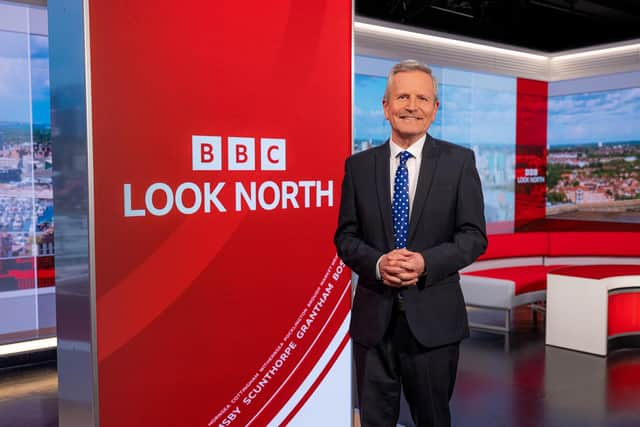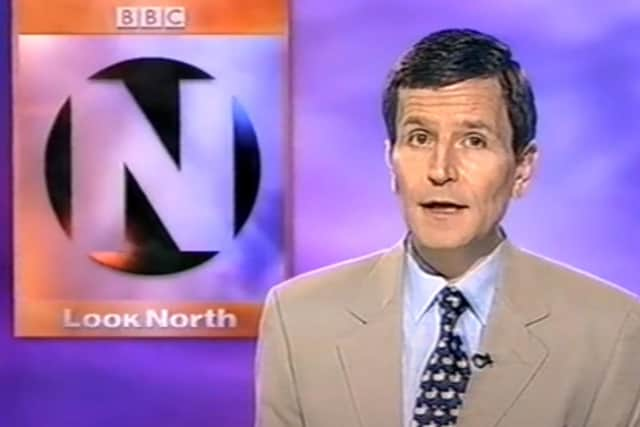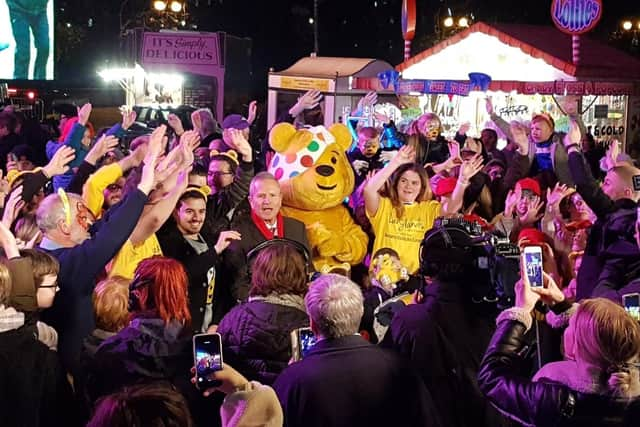BBC Look North's Peter Levy on his beloved Hull, the Selby rail disaster and working through the Covid pandemic
BBC presenter Levy moved to the area in 2002 with the launch of the new Look North East Yorkshire and Lincolnshire programme. He has been news anchor on the show ever since, most recently presenting the evening and late editions. But today that will change. Levy will remain the face of the evening edition, but will no longer be fronting the late show. Instead, he will be on viewers’ television screens for the lunchtime news, a role he previously did for Look North in Leeds 21 years ago. "I’ll finish at 7pm,” he explains. “That will be nice, after nine years of not seeing any evening television or ever having tea at home.”
“Going back to [the lunchtime news] is a big deal, quite exciting,” he continues. “It’s like turning the clock back a bit, although the technology has changed a lot. Back then, when you ran a bit of film in, you ran it five seconds before it needed to start, whereas now it’s a click of a button and it plays from a magic digital server. Things like that have changed a lot. But news stories come and go and in some ways that side of things doesn’t change.”
Advertisement
Hide AdAdvertisement
Hide AdIn his 36 years with the BBC, it’s fair to say he’s covered a few. Among those that had the biggest impact was the 2001 high-speed train crash at Great Heck near Selby, one of the worst rail disasters the country has ever seen. “I was doing the lunchtime news at the time,” Levy recalls, “and I remember being shocked by how dreadful that was, two trains colliding, ten people killed. Just a few months later I would be going on the M62 [to Hull] over where that train line is. I think about it still to this day.”


Another, more positive story, sticks in the mind of the 68-year-old adopted Yorkshireman. After growing up in Cornwall, he’s called the region home for almost 50 years and sees himself as a champion for Hull in particular – and for the city’s people. He can remember clearly back in 2014 when engineering giant Siemens confirmed that Hull would be the location for its major wind turbine production facility.
“One day, I got a phonecall in the morning to say you’re going to be interviewing Prime Minister David Cameron this afternoon. He came up to announce that Hull had got it and Siemens was going to be built here. The rest is history really…It’s just down the road and employs around 1,000 people working day and night making huge turbine blades. It was a game changer for Hull, led to employment and put Hull on the map – not for fishing as we were in the 70s, but for being a hub for greener energy.”
His beloved Hull has been home now for two decades, but Levy’s career in Yorkshire actually started in Bradford. He moved to the city in 1975 for the launch of new station Pennine Radio. It was his first job in broadcasting and a proud moment for the then 19-year-old, who as a boy was “obsessed” with hearing the news on TV and radio. His five years there were followed by a stint at Radio City in Liverpool before Levy helped to launch Radio Aire in Leeds in 1981. He stayed there until 1987 before joining the BBC with Radio Leeds. From there, he made his television debut and soon became a presenter on Look North in Leeds. When he joined, the show covered the whole Yorkshire and Lincolnshire region, but it was later split into two – and Levy made the move to Hull.
Advertisement
Hide AdAdvertisement
Hide Ad"When I joined Look North, I was alongside giants like Judith Stamper and the late Harry Gration,” Levy remembers. “You really had to learn quickly. The mechanisms and the way TV works is very different from radio, much more exacting, timing is much more crucial. But I felt really at home in the studio doing TV and loved it right from day one."


The world of TV news he grew to know changed drastically in 2020 with the global Covid-19 pandemic. In-person interviews turned into video calls and microphones were rigged onto long poles to enable people to social distance. Levy found himself regularly reporting on the number of people being treated for the virus in Hull Royal Infirmary and the growing death toll across the country. “We had massive amounts of pressure upon us, really from the public, for them to get the information they needed to know,” he reflects.
“They also needed to be reassured and they needed to be cheered up...It was hard, at times upsetting and distressing. But also it taught us a whole new way of working that has lived on after Covid ended. It also taught us the importance of having fun...I still used to joke and mess around with [weatherman] Paul [Hudson], we still had fun, because it was needed more than ever.”
Levy says he has never been scared to ask difficult questions and to hold people to account. “You’re in this privileged position of being able to question people and you want to get the answers that people at home want,” he explains. “Sometimes that means not being rude but cutting over and interrupting people because television is very short of time. If you’ve only got three minutes, you can’t let a politician waffle on and burn up that time and not answer any questions.”
Advertisement
Hide AdAdvertisement
Hide AdThere remains, he is adamant, a place for local television. Despite witnessing a huge shift over his career in the way people are accessing information, he believes it will long-continue to have its place alongside online offerings.


“Even a programme like Strictly had far more audience ten years ago than it has today and television viewing is coming down,” he acknowledges. “But within that people make their choices and...they care about their local area and want to know about where they live. I think local news, regional news has a very healthy future.”
